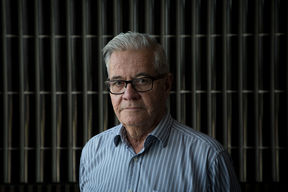Erkki Oja has been awarded the Frank Rosenblatt Award for his achievements in artificial intelligence research

Recent developments in artificial intelligence research seem incredible to Professor Erkki Oja, who has been researching neural networks since the 1970s. Back then, there were only a few researchers in this field and their innovations did not lead to much because they could not be tested with large amounts of data. Computers were simply too inefficient.
Now Erkki Oja has been awarded the Frank Rosenblatt Award for his achievements in artificial intelligence research.
‘Neural networks have been making a breakthrough in the last ten years. These days papers and magazines have lots of articles about artificial intelligence, machine learning, and neural networks. I am a bit annoyed that I retired just when the artificial intelligence boom started!’ Erkki Oja said.
During Oja's career, neural network research was conducted by a small group of people and there wasn’t much publicity about it. In the 1980s and 1990s there was a slight increase in interest, but it also faded away. However, the research continued and its popularity persistently grew, resulting in over 50 doctoral graduates from Oja’s group. A lot of students also graduated with a Master of Science in Technology degrees.
‘I was a little worried about whether all the graduates would find work. But now their particular skills are in high demand,’ said Oja.
One of the grounds for the Frank Rosenblatt Award include the "Oja rule" developed by Erkki Oja in 1982. It is based on a model developed by Frank Rosenblatt in the 1950s, according to which learning is the strengthening of synapses and nerve connections.
‘The Oja rule is used in artificial neural networks. However, most of the references now come from brain research,’ Oja said.
For example, the Oja rule has been used in the European Union-funded Human Brain Project, which aims to build a model of the brain. Oja's research group also developed independent component analysis, which further improved the Oja rule’s algorithm.
Artificial intelligence from a pioneer’s point of view
The current artificial intelligence algorithms are basically the same as in the 1980s. On the other hand, computational efficiency and data volumes have increased dramatically. Each problem requires its own artificial intelligence, for example, speech-recognising artificial intelligence cannot recognise images.
According to Erkki Oja, artificial intelligence algorithms should not be blindly relied upon, for example, because they lack morals. In addition, the logic of decision-making is based on the data on which the artificial intelligence has been trained.
‘Data may cause distortions. For example, granting of a loan should be based on the applicant’s income and housing information, but skin colour may become a decisive factor in decision-making,’ Oja said.
From the perspective of digitalisation and automation, artificial intelligence has enormous potential. Likewise, digital human sciences can provide a more accurate idea of what people want and how they think. According to Oja, it is however obvious that this also creates opportunities for abuse.
On 18th September, the Finnish Center for Artificial Intelligence (FCAI) will host a Frank Rosenblatt lecture by Erkki Oja on forty years of unsupervised machine learning. Read more about the lecture, Erkki Oja's research and his career https://www.aalto.fi/en/events/erkki-oja-ieee-frank-rosenblatt-award-lecture
Further information:
Read more news

‘Mesoscale’ swimmers could pave way for drug delivery robots inside the body
Researchers have discovered how tiny organisms break the laws of physics to swim faster — such secrets of mesoscale physics and fluid dynamics can offer entirely new pathways for engineering and medicine.
Design strengthens industrial competitiveness – human-centered factory work at the core
Factory work is undergoing a transformation: new technologies and artificial intelligence are changing the content and roles of work. Aalto University’s Department of Design is studying this change from a human-centered perspective in the HiFive project.
The proxy server for remote access to e-resources is changing
If you have problems using e-resources, try accessing the e-resource using VPN connection.






